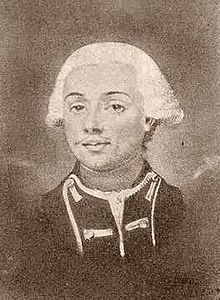Gaspard Jean-Baptiste de Brunet

Gaspard Jean-Baptiste de Brunet (born June 14, 1734 in Valensole ( Département Basses-Alpes ); executed by guillotine on November 15, 1793 in Paris ) was a Général de division during the French Revolution .
Life
Gaspard Jean-Baptiste de Brunet was the son of country nobleman Jean-Baptiste de Brunet, captain of the dragoons, governor of Manosque , knight of the Ordre royal et militaire de Saint-Louis and d'Anne Rose de Salve. He was the grandson of Paul de Brunet, seigneur d'Estoublon et de Molan, married on November 11, 1666 in Manosque to Marie de Robert. He was the father of Général Jean-Baptiste Brunet.
Military career
- in the Ancien Régime
He began his military career in 1755 in the royal artillery, but moved to the Régiment des Gardes-Lorraine as a lieutenant in November of the same year .
During the Seven Years' War he initially served in Germany from 1757 to 1758. On March 31, 1750 he was promoted to Capitaine and on May 13 of the same year was appointed Aide-major (Deputy Chief of Staff of a Regiment). In the years 1761 to 1762 he again held a troop command during the fighting in Germany.
On March 2, 1773 he was awarded the Chevalier des Ordre royal et militaire de Saint-Louis .
On July 4, 1777, he became the commandant of a grenadier company and on October 1 of the same year, the commandant of a fusilier company. On March 26, 1778, he was given the post of major (head of the regimental staff) in the "Régiment provincial d'Auxonne" (Auxonne Provinzialregiment). On April 6, 1779 he was promoted to lieutenant colonel .
- Revolutionary Wars
From 1790 to 1791 he was administrator of the Basses-Alpes department and commandant général of the national guard in the department. After being promoted to the Maréchal de camp, he resigned on March 1, 1791.
Recalled by the Général de Montesquiou into active service, he was placed under the command of Général d'Anselme on September 18, 1782 and took over the vanguard of the right wing of the Armée d'Italie . With this he was involved in the campaign in Savoy and took over interim command of the army during the absence of d'Anselme in the period from December 24, 1792 to February 6, 1793.
On February 14th, he and his troops attacked the fortifications of Sospel , whereupon the Minister of War Beurnonville commended him for his services in this matter.
On March 1st and 2nd he seized the heavily fortified town of Belvédère and chased 5,000 Piedmontese soldiers along with their supporting artillery in front of him. He managed to take 200 prisoners and capture two cannons. These services should not go unrewarded, on March 8, 1793 he was promoted to Général de division . Representing Général Biron , he again acted as commander-in-chief of the Armée d'Italie from May 5 to August 8, 1793. The confirmation as "Général en chef" was made by the National Convention on May 26, 1793. He was subordinate to the Général Kellermann , who led the " Armée des Alpes ".
Arrest and Execution
On June 8, he advanced against the Sardinian outposts at Camp des Fourches in the Massif de l'Authion and pushed them back to the foot of the Turini Camp d'argent . But when he began a new attack against Saorge on July 17th , he encountered such fierce opposition that he had to withdraw with great losses. The Jacobin Club in Paris immediately began shouting “treason” and continued to claim that Brunet was involved in the surrender of Toulon to the English.
They backed up their allegations with alleged knowledge of contacts he had with the former prosecutor of the Var department and also by refusing to support the representatives of the people in this department.
He was replaced in his command by Général Carteaux . On August 6, 1793, an arrest warrant was issued by Barras and Fréron , which was carried out on August 8 by the delivery of Brunet to the Prison de l'Abbaye in St. Germain .
On September 10, 1793, he lost his position as general and was transferred to the Conciergerie on November 8 . On November 14th was sentenced to death for the following two reasons:
- Refusal to follow the instructions of the People's Deputies Barras and Fréron and to send parts of his army to Toulon when the city's betrayal became apparent.
- To have entered into correspondence with the rebel committees of Lyon and Marseilles
He was guillotined on November 15, 1793 at the age of 59.
His name can be found in the 23rd row on the south pillar of the Arc de Triomphe de l'Étoile in Paris.
Footnotes
literature
- Pierre Larousse : Grand Dictionnaire universel du XIX siècle. 15 volumes, (1863–1890)
- Louis Gabriel Michaud : Biography universal ancienne et modern. (35 vol. 1773-1858);
- Georges Six: Dictionnaire biographique des généraux et amiraux français de la Révolution et de l'Empire. (2 vol. 1934)
- Actes paroissiaux de Valensole
| personal data | |
|---|---|
| SURNAME | Brunet, Gaspard Jean-Baptiste de |
| BRIEF DESCRIPTION | French general |
| DATE OF BIRTH | June 14, 1734 |
| PLACE OF BIRTH | Valensole |
| DATE OF DEATH | November 15, 1793 |
| Place of death | Paris |